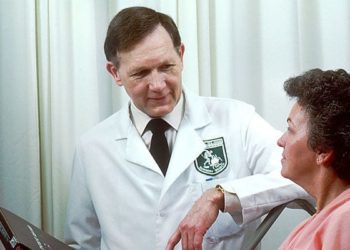Haloperidol does not improve outcomes at 90 days in ICU patients with delirium
1. In intensive care unit (ICU) patients with delirium, haloperidol treatment did not improve the number of days alive and out of hospital at 90 days compared to placebo.
2. Haloperidol treatment was associated with a modestly lower mortality rate compared to placebo.
Evidence Rating Level: 1 (Excellent)
Study Rundown: Delirium is an acute disruption in attention and awareness. Patients with critical illnesses, such as those admitted to the ICU, are particularly vulnerable to developing delirium due to central nervous system dysfunction. Haloperidol is a typical antipsychotic drug that is frequently used to treat delirium in hospitalized patients both inside the ICU and out. However, there is limited and equivocal evidence of its benefits. The current study was a randomized controlled trial to investigate the efficacy of haloperidol in treating delirium among ICU patients. Adult ICU patients with delirium received either haloperidol (2.5mg three times daily plus 2.5mg as needed) or a placebo for the duration of delirium. At 90 days, there was no statistically significant difference in the number of days alive and out of the hospital between the haloperidol and placebo groups. The mortality rate was modestly lower in those treated with haloperidol. Study limitations included the predominance of hyperactive delirium patients and the composite nature of the primary outcome, limiting its interpretation. Nevertheless, these findings showed that haloperidol did not result in appreciable benefits in treating delirium in ICU patients.
Click here to read the study in NEJM
In-Depth [randomized controlled trial]: This study was a blinded, placebo-controlled trial assessing the efficacy of haloperidol in treating delirium in ICU patients. Adult patients admitted to the ICU with an acute condition who screened positive for delirium based on the Confusion Assessment Method or the Intensive Care Delirium Screening Checklist were eligible for inclusion. Exclusion criteria included receipt of another antipsychotic agent, contraindication to haloperidol, inadequate assessment for delirium, or delirium tremens. Overall, 1,000 patients were randomized 1:1 to receive intravenous haloperidol (2.5mg three times daily plus 2.5mg as needed to a daily maximum of 20mg) or placebo for the duration of their delirium. The primary outcome was the number of days alive and out of the hospital at 90 days following randomization. Secondary outcomes included the components of this composite (death and length of hospital stay at 90 days), number of days alive without delirium or coma, number of days alive without mechanical ventilation, and number of patients requiring rescue medication. At 90 days, the mean number of days alive and out of the hospital was 35.8 in the haloperidol group and 32.9 in the placebo group (adjusted mean difference of 2.9 days, 95% Confidence Interval [CI], -1.2 to 7.0; p=0.22). The mortality rate at 90 days was 36.3% in the haloperidol group and 43.3% in the placebo group (adjusted absolute difference, -6.9 percentage points, 95% CI, -13.0 to -0.6). The adjusted mean difference in hospital length of stay was 2.3 days between the haloperidol group and placebo group (95% CI, -0.6 to 5.1). No statistical differences were observed in the number of days alive without delirium, coma, or mechanical ventilation. The need for physical restraint was comparable between the two groups. These results demonstrated that the use of haloperidol did not result in a greater number of days alive and out of the hospital at 90 days compared to the placebo.
Image: PD
©2023 2 Minute Medicine, Inc. All rights reserved. No works may be reproduced without expressed written consent from 2 Minute Medicine, Inc. Inquire about licensing here. No article should be construed as medical advice and is not intended as such by the authors or by 2 Minute Medicine, Inc.









